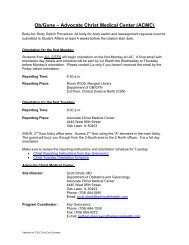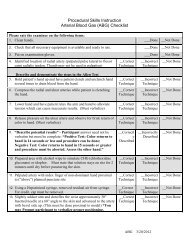a PDF version of the Full Hematology Oncology Curriculum
a PDF version of the Full Hematology Oncology Curriculum
a PDF version of the Full Hematology Oncology Curriculum
You also want an ePaper? Increase the reach of your titles
YUMPU automatically turns print PDFs into web optimized ePapers that Google loves.
5. Knowledge <strong>of</strong> <strong>the</strong> preparative regimens used in anticipation <strong>of</strong> autologous and allogeneic<br />
BMT/SCT.<br />
6. Understand <strong>the</strong> method <strong>of</strong> collecting and handling bone marrow and peripheral stem cells<br />
for transplantation.<br />
7. Understand <strong>the</strong> approaches used to mobilize hematopoietic stem cells to <strong>the</strong> peripheral<br />
blood<br />
8. Practical competency <strong>of</strong> <strong>the</strong> process <strong>of</strong> performing autologous and allogeneic BMT/SCT.<br />
9. Understand <strong>the</strong> need for prophylactic and supportive care measures in patients undergoing<br />
BMT/SCT.<br />
10. Understand approaches to preventing infectious diseases<br />
11. Understand <strong>the</strong> use <strong>of</strong> immunosuppressive <strong>the</strong>rapies to prevent or decrease graft‐versus‐<br />
host disease<br />
12. Understand <strong>the</strong> complications that can occur post‐transplant, including marrow<br />
engraftment failure, acute and chronic graft‐versus‐host disease, opportunistic infections,<br />
veno‐occlusive disease, and o<strong>the</strong>rs.<br />
Overview <strong>of</strong> <strong>the</strong> Rotation:<br />
During this rotation, fellows work with an attending, one resident and 2 interns to cover patients on <strong>the</strong><br />
inpatient hematology service. The fellow and attending with <strong>the</strong> assistance <strong>of</strong> a mid‐level practioner are<br />
also be responsible for <strong>the</strong> care <strong>of</strong> inpatients undergoing autologous and allogeneic stem cell transplant.<br />
Patients on this joint service are <strong>of</strong>ten very sick and <strong>of</strong> a high level <strong>of</strong> acuity.<br />
II. Core Competencies and <strong>Curriculum</strong><br />
Teaching Methods / Clinical Encounters<br />
During this rotation, fellows evaluate inpatients on <strong>the</strong> service on a daily basis. This service deals with all<br />
hematology inpatients except those with sickle cell disease. Patients admitted to <strong>the</strong> service are first<br />
evaluated by <strong>the</strong> resident, intern or fellow, <strong>the</strong>n discussed when possible with <strong>the</strong> fellow, and finally<br />
presented formally to <strong>the</strong> attending and <strong>the</strong> rest <strong>of</strong> <strong>the</strong> team. Prior to <strong>the</strong> presentation, whenever a case<br />
is difficult, unusual, or challenging, fellows and residents will locate and print an article that addresses<br />
<strong>the</strong> problem being evaluated.<br />
This rotation values and emphasizes teaching. Frequently, every person on <strong>the</strong> team participates in<br />
teaching: attendings, fellows and residents. Fellows teach during short lectures to <strong>the</strong> team usually<br />
when <strong>the</strong> attending is not present. Attendings teach both during sitting rounds (presentation <strong>of</strong> new<br />
consultations and follow‐up problems) and during walking rounds (at <strong>the</strong> bedside). They also present<br />
“mini‐lectures”, and more formal lectures on <strong>the</strong> topic <strong>of</strong> <strong>the</strong>ir choice. Frequently, <strong>the</strong> fellow or one<br />
member <strong>of</strong> <strong>the</strong> team will request a specific topic.<br />
Patient Characteristics / Disease Mix<br />
The patient mix is predominantly patients with malignant hematologic disorders who are in hospital for<br />
treatment <strong>of</strong> <strong>the</strong> underlying disease or for complications <strong>of</strong> <strong>the</strong>ir disease/ treatment. The degree <strong>of</strong><br />
38



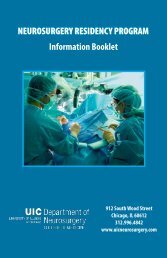
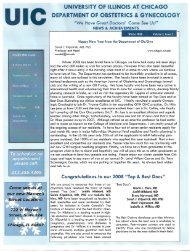
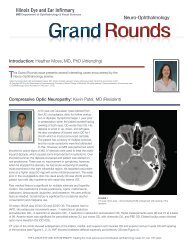
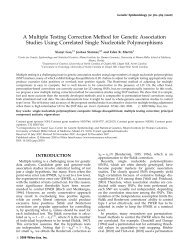
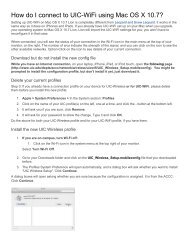
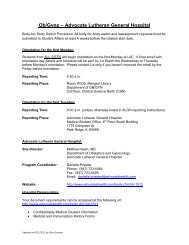
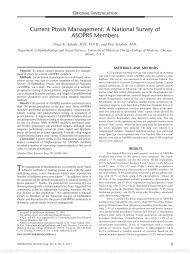
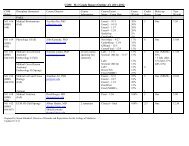
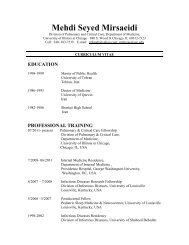
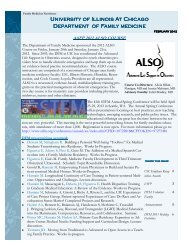
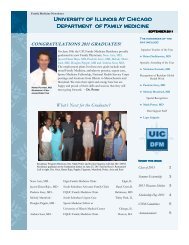
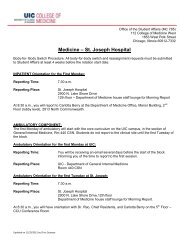
![CV Joan [W51] - University of Illinois College of Medicine at Chicago ...](https://img.yumpu.com/17336863/1/190x245/cv-joan-w51-university-of-illinois-college-of-medicine-at-chicago-.jpg?quality=85)
